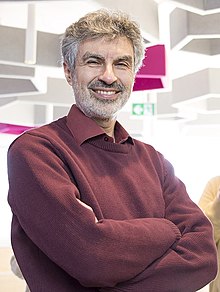
Back يوشوا بنجيو Arabic يوشوا بنجيو ARZ Yoshua Bengio Catalan Yoshua Bengio German Yoshua Bengio Esperanto Yoshua Bengio Spanish یوشوا بنجیو Persian Yoshua Bengio French יהושע בנג'יו HE योशुआ बेंगियो Hindi
Yoshua Bengio | |
|---|---|
 Yoshua Bengio in 2019 | |
| Born | March 5, 1964 Paris, France |
| Citizenship | Canada |
| Alma mater | McGill University |
| Known for | |
| Relatives | Samy Bengio (brother) |
| Awards | Marie-Victorin Prize (2017) Turing Award (2018) AAAI Fellow (2019) Legion of Honor (2022) |
| Scientific career | |
| Fields | Machine learning Deep learning Artificial intelligence[1] |
| Institutions | Université de Montréal MILA Element AI |
| Thesis | Artificial Neural Networks and their Application to Sequence Recognition (1991) |
| Doctoral advisor | Renato de Mori[2] |
| Notable students | Ian Goodfellow[2] |
| Website | yoshuabengio |
Yoshua Bengio OC FRS FRSC (born March 5, 1964[3]) is a Canadian computer scientist, most noted for his work on artificial neural networks and deep learning.[4][5][6] He is a professor at the Department of Computer Science and Operations Research at the Université de Montréal and scientific director of the Montreal Institute for Learning Algorithms (MILA).[1]
Bengio received the 2018 ACM A.M. Turing Award (often referred to as the "Nobel Prize of Computing"), together with Geoffrey Hinton and Yann LeCun, for their work on deep learning.[7] Bengio, Hinton, and LeCun are sometimes referred to as the "Godfathers of AI" and "Godfathers of Deep Learning".[8][9][10][11][12][13] In 2024, TIME Magazine included Bengio in its yearly list of the world's 100 most influential people.[14] As of August 2024, he is the world's most-cited computer scientist by h-index.[15]
- ^ a b Yoshua Bengio publications indexed by Google Scholar
- ^ a b Cite error: The named reference
mathgenewas invoked but never defined (see the help page). - ^ "Yoshua Bengio - A.M. Turing Award Laureate". amturing.acm.org. Archived from the original on November 27, 2020. Retrieved December 15, 2020.
- ^ Knight, Will (July 9, 2015). "IBM Pushes Deep Learning with a Watson Upgrade". MIT Technology Review. Retrieved July 31, 2016.
- ^ Yann LeCun; Yoshua Bengio; Geoffrey Hinton (May 28, 2015). "Deep learning". Nature. 521 (7553): 436–444. doi:10.1038/NATURE14539. ISSN 1476-4687. PMID 26017442. Wikidata Q28018765.
- ^ Bergen, Mark; Wagner, Kurt (July 15, 2015). "Welcome to the AI Conspiracy: The 'Canadian Mafia' Behind Tech's Latest Craze". Recode. Archived from the original on March 31, 2019. Retrieved July 31, 2016.
- ^ "Fathers of the Deep Learning Revolution Receive ACM A.M. Turing Award". Association for Computing Machinery. New York. March 27, 2019. Archived from the original on March 27, 2019. Retrieved March 27, 2019.
- ^ "'Godfathers of AI' honored with Turing Award, the Nobel Prize of computing". March 27, 2019. Archived from the original on April 4, 2020. Retrieved December 9, 2019.
- ^ "Godfathers of AI Win This Year's Turing Award and $1 Million". March 29, 2019. Archived from the original on March 30, 2019. Retrieved December 9, 2019.
- ^ "Nobel prize of tech awarded to 'godfathers of AI'". The Telegraph. March 27, 2019. Archived from the original on April 14, 2020. Retrieved December 9, 2019.
- ^ "The 3 'Godfathers' of AI Have Won the Prestigious $1M Turing Prize". Forbes. Archived from the original on April 14, 2020. Retrieved December 9, 2019.
- ^ Ray, Tiernan. "Deep learning godfathers Bengio, Hinton, and LeCun say the field can fix its flaws". ZDNet. Archived from the original on March 3, 2020. Retrieved February 15, 2020.
- ^ "Turing Award Winners 2019 Recognized for Neural Network Research - Bloomberg". Bloomberg News. March 27, 2019. Archived from the original on April 10, 2020. Retrieved February 15, 2020.
- ^ "The 100 Most Influential People of 2024". TIME. Retrieved August 28, 2024.
- ^ "Best Computer Science Scientists". research.com. Retrieved November 21, 2023.